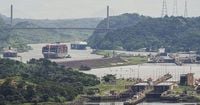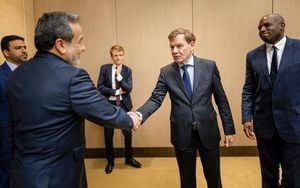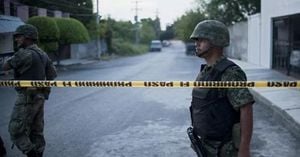At the United Nations headquarters on August 11, 2025, two global superpowers—China and the United States—locked horns in a heated debate over the future and control of the Panama Canal. The meeting, convened by Panama's President José Raúl Mulino, who currently holds the U.N. Security Council presidency, was meant to address the mounting challenges of maritime security. Instead, it quickly became a stage for a public clash between Washington and Beijing, each accusing the other of threatening the neutrality and stability of one of the world's most crucial trade arteries.
The Panama Canal, which links the Atlantic and Pacific oceans, has always held strategic importance. Built by the United States in the early 1900s, it was transferred to Panama in 1999 under a historic treaty signed in 1977 by President Jimmy Carter. Since then, Panama has prided itself on managing the canal efficiently, ensuring its neutrality and openness to global shipping and trade.
But that legacy is under strain. As reported by NPR and the Associated Press, President Mulino opened the Security Council session by reaffirming his nation's sovereignty and the canal's neutrality. "Panama has consistently and effectively managed the canal, making significant contributions to global shipping and trade," Mulino asserted, emphasizing that the waterway remains a pillar of international commerce, not a pawn in great power rivalry.
Interpol Secretary General Valdecy Urquiza added to the sense of urgency, warning council members about the modern threats facing maritime security. "These include piracy, armed robbery, transnational crime and cyber criminals weaponizing artificial intelligence to attack ports where there is minimal cyber security, maximum exposure," he said. The message was clear: the canal faces threats both old and new, and international cooperation is more vital than ever.
Yet, the spotlight quickly shifted from criminal threats to geopolitical ones. The United States, represented by Acting U.S. Ambassador Dorothy Shea, voiced deep concerns about Chinese involvement in the canal's critical infrastructure and port operations. Shea argued, "China's expansive and unlawful maritime claims and aggressive actions demonstrate its threat to maritime security and commerce." Linking the situation in Panama to China's activities in the South China Sea, she maintained, "China's influence in the canal area is not just a risk to Panama and the United States, but rather a potential threat to global trade and security."
These anxieties did not emerge in a vacuum. According to AP, U.S. President Donald Trump, even before his 2024 election victory, had publicly suggested that the United States should consider retaking control of the Panama Canal. He accused Panama of ceding too much influence to China, thrusting the canal into the center of American political debate. The Trump administration has since pressured China to force the Hong Kong-based operator of ports at both ends of the canal to sell its interests to a U.S.-led consortium, which includes the financial giant BlackRock Inc.
China, for its part, was quick to fire back. China's U.N. Ambassador Fu Cong insisted that his country has always respected the canal's permanent neutrality and Panama's sovereignty. "China has always respected the permanent neutrality of the canal and firmly supports Panama in safeguarding its sovereignty over the canal to ensure its openness and smooth operation," Fu told the council. He further accused the United States of fabricating accusations as a pretext for seeking control: "The United States' fabrication of lies and groundless attacks against China are nothing but a pretext for seeking control of the canal."
Fu was not finished. He lambasted the Trump administration's military deployments in the South China Sea, calling the U.S. "the biggest disrupter of peace and stability" in the region. "China firmly opposes economic coercion and bullying practices and urges the United States to stop fabricating rumors, lies and creating trouble," he declared. The Chinese delegation's message was unequivocal: Beijing sees itself as a defender of international law and Panama's sovereignty, not an aggressor.
Meanwhile, the situation on the ground in Panama has grown more complicated. In April 2025, U.S. Defense Secretary Pete Hegseth visited Panama and reached an agreement with President Mulino to enhance security coordination. This pact grants U.S. troops access to strategic air and naval facilities in the Central American nation. While Washington describes this as a necessary response to rising security threats, it has sparked significant protests in Panama City. Many Panamanians see the move as a step backward, raising fears of foreign military presence and renewed outside influence over their nation's affairs.
President Mulino sought to calm these anxieties during the U.N. session. He reiterated Panama's unwavering commitment to the canal's neutrality, describing it as "the only and the best defense" against both specific and global threats. He also underscored the importance of the multilateral treaty that governs the canal's administration, insisting that Panama's sovereignty "in terms of the ownership of the canal" is non-negotiable.
The deeper roots of this dispute are tangled in history and changing geopolitics. The United States' construction and long-term control of the canal shaped Panama's 20th-century destiny, but the handover in 1999 was supposed to mark a new era of national self-determination. Now, as China expands its global reach through investment and infrastructure projects, the U.S. sees its own influence waning in the Western Hemisphere. The canal, once a symbol of U.S. engineering might, has become a flashpoint for fears about shifting power balances and the vulnerabilities of global trade routes.
Observers note that the current standoff at the U.N. is not just about the canal itself, but about broader questions of trust, sovereignty, and the rules that govern international commerce. Both Washington and Beijing frame their positions as protective: the U.S. warning of the dangers of Chinese expansion, China decrying what it calls American "bullying practices." Yet, caught in the middle is Panama, striving to assert its independence while managing the pressures of two giants.
As the Security Council meeting drew to a close, it was clear that the Panama Canal remains as strategically important—and as contested—as ever. The world watches closely, aware that any disruption to this vital waterway could send shockwaves through the global economy. For now, Panama stands firm in its declaration of neutrality, hoping that principle will be enough to keep the peace and the ships moving.




